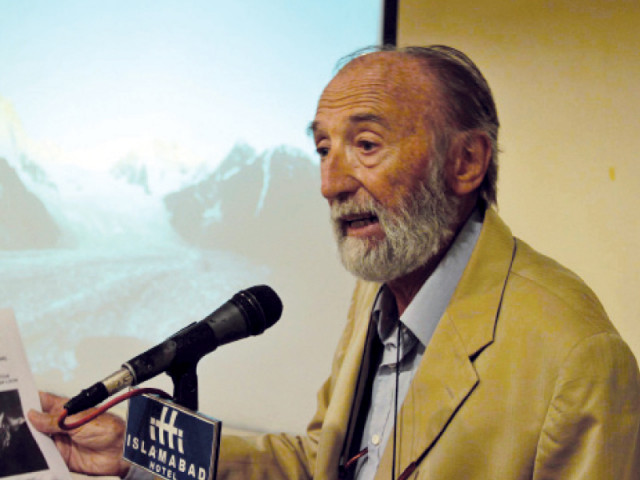Promoting tourism: No decline in adventure tourism despite security situation
Group of local mountaineers complete specialised course.

Pinelli, chief of Asian desk at MWI, believes only responsible and reliable mountaineers can teach others to negotiate mountaineering skills. PHOTO: MUHAMMAD JAVAID/EXPRESS
A group of twenty-three people, including seven girls and three Afghans, from the Wakhi-speaking community are ready to train other mountaineers and work as trekking guides.
The group had been part of a 16-day course on “Environment-Friendly Mountaineering”, taught by five Italian and one British instructor, conducted in the Upper Hunza Valley from August 25 to September 9. It was organised by the Mountain Wilderness International (MWI), an organisation devoted to protecting mountains from environmental degradation, and the Aga Khan Foundation (AKF).
The purpose of the course was to promote outdoor tourism in the western Karakoram and Hindu Kush by providing specialised mountaineering training to locals and getting them to pass on the lessons learnt, said Professor Carlo Alberto Pinelli.
“To teach how to teach was our goal,” Pinelli, one of the Italian instructors and the Chief of the Asian Desk of the MWI, said. “We wanted to improve economic conditions of local communities without damaging the environment or harming the local cultural heritage.”
The trainees were taught the theory of mountaineering along with practical lessons in techniques of rock and ice climbing, safety protocols and environment protection methods, said Tommaso Castorina, another instructor.
At the end of the course, the trainees were given a selective exam to evaluate their technical and training skills.
“Our intention was to cover a serious course,” Pinelli said. “We believe only responsible and reliable mountaineers can teach others to negotiate mountaineering skills.”
Only 12 of the 23 trainees succeeded in getting a diploma of “mountaineering instructor” after the course. One woman, Farzana Jabeen of Shimshal, was among the 12 instructors who will now go ahead and train other instructors at the Shimshal Mountaineering School to ensure the initiative’s sustainability. Six participants graduated the course as “trekking guides” and five as “assistant trekking guides.”
“The presence of women trainees challenged the superficial and outdated ideas some westerners still have about Pakistani women,” Pinelli said.
Alpine Club of Pakistan (ACP) President Colonel (retd) Manzoor Hussain said people from Shimshal are not only excellent mountaineers but they have also been developing mountaineering skills in their area by training women as well.
Samina Baig, the first Pakistani woman to climb Mount Everest, also belongs to Shimshal.
Pinelli said the trainees were also taught to protect the environment during climbing and trekking activities. “As a climber, you should not leave any trace of your passage,” he said. “You must meet the mountain as God made it and leave it as God made it.”
AKF Programme Officer Azizullah Baig said the course was planned to send a message to the outside world that Pakistanis harbour a great love for mountaineering.
“Even though the tourism industry in Gilgit-Baltistan and Chitral has collapsed by nearly 70 per cent due to the law and order situation, there has been no decline in adventure tourism,” Baig said.
He said 109 international trekking parties came to Pakistan in 2011 and the number increased to 141 in 2012. But a lot of foreign commercial agencies bring Nepalese Sherpas, disguised as mountaineering clients with them, to act as porters.
This prevents local high-altitude porters from benefitting from adventure tourism as Pakistan loses around $0.5 million each season to foreign porters, Baig said.
The course was restricted to Wakhi-speaking people and Afghans from the Wakhan Corridor — a land link between north-eastern Afghanistan and China, part of which falls in Afghanistan’s Badakshan province.
It was funded by the AKF and the MWI through private donors such as the Academic Alpine Club of Italy.
Published in The Express Tribune, September 14th, 2013.






1733130350-0/Untitled-design-(76)1733130350-0-208x130.webp)












COMMENTS
Comments are moderated and generally will be posted if they are on-topic and not abusive.
For more information, please see our Comments FAQ